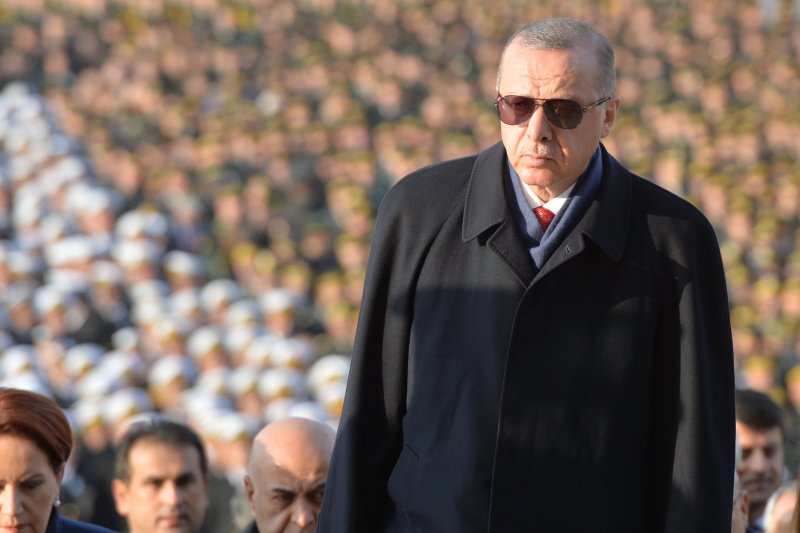Apparently, the U.S. withdrawal from Syra is a victory for Turkish President Recep Tayyip Erdogan, as he will have a free hand with the Kurds. In reality, the American withdrawal is not so good news for the Turks. File Photo by EPA-EFE
Dec. 26 (UPI) -- U.S. President Donald Trump surprised everyone when he announced on Twitter that he will be withdrawing American troops from Syria. The United States has 2,000 troops deployed in the north and the northeast of the country. His reason is that the Islamic State is defeated and there is no more reason to stay in Syria.
Republican Sen. Lindsey Graham said the move was taken without consulting with Secretary of State Mike Pompeo, Defense Secretary James Mattis or National Security Adviser John Bolton. Following this, Mattis resigned citing disagreement with the president. Mattis also mentioned that the United States should not abandon its allies. In the Syrian case, they are the Kurdish forces that fight along with the Americans.
The announcement was made after Trump had a call with his Turkish counterpart. The two leaders spoke after Turkish President Recep Tayyip Erdogan stated from a televised appearance that he is planning an incursion to clear the east of the Euphrates from the "Kurdish terrorists." Erdogan expressed dissatisfaction with the presence of YPG in Menbij, despite the agreement sealed with the United States to turn in the town to the Turkish jurisdiction. In his announcement, Erdogan said the operation will not target U.S. personnel.
Apparently, the U.S. withdrawal is a victory for Erdogan, as he will have a free hand with the Kurds. In reality, the American withdrawal is not so good news for the Turks. Erdogan should be careful what he wishes for. He might be able to conduct his incursion freely and eliminate what he perceives as a threat represented by the YPG, but then what?
The Americans were keeping a kind of balance, keeping the Kurdish factions under control. Now that the Kurds are without American protection, they might take drastic actions. Feeling cornered, they might join Syrian President Bashar al-Assad. Alternatively, feeling it is a do-or-die, they might escalate attacks on Turkish targets. Turkey wants to ostracize the Kurds, but at the same time they do not want to empower Assad and the Iranians.
With the American withdrawal, the Turkish-Russian agreement on Idlib seems shaky. The emboldened Assad will re-initiate efforts to attack the remaining stronghold of the opposition. Chaos is starting to foment. An observer on the ground noticed confusion among the U.S. troops in Qameshly. People don't know what to do. The withdrawal does not only include military troops but also State Department personnel responsible for rebuilding the water network, the infrastructure, the schools etc. The United States will be leaving the north and northeast for Turkey to deal with and to protect from Assad and its allies. Will Turkey be able to stabilize the large swath of territory by itself? I doubt it.
Though Russian President Vladimir Putin endorsed Trump decision, the Russians are "cautiously happy" as described by a source. Russia fears that the withdrawal will result in chaos. Russia is not in Syria for any ideological purpose. It is there for influence and economic gain. Therefore, its priority is stability. Also, Assad has not been an easy ally to work with. Now that he thinks he won he will be even more difficult to handle. The U.S. presence was a kind of buffer keeping everyone at a distance from a confrontation.
One might ask why Trump made such a brash decision to go against the advice of his trusted deputies. One option would be that he feels under pressure because of the Mueller investigation and he is throwing a tantrum. The other option is that he is staging a political stunt to remind his base that he keeps his promises. One of the main promises was to retreat from world affairs, problems and conflicts and focus domestically. The third option is that he is applying the "madman theory" of former President Richard Nixon. The approach is based on the fact if the leader of the most powerful country acts like a madman, then the rivals and allies would be careful not to provoke him.
This sudden withdrawal could be a "deal with it" tactic that will disturb the current equilibrium and push the different parties to broker a deal. Such a deal will lead to a concrete solution instead of isolating Assad, which might take two or three years to be fruitful. However, those are only speculations. Only the coming period will show us what is the real motive behind Trump's decision. In the meantime, we can expect more chaos and more tension and several armed confrontations.
Dania Koleilat Khatib is executive director of the Al Istishari Al Strategy Center for Economic and Future Studies, a UAE-based independent think tank. She specializes in U.S.-Arab relations and researches sectarianism, extremism and governance. Her book "The Arab Lobby and the U.S.: Factors for Success and Failure" was published by Routledge UK and translated to Arabic.















